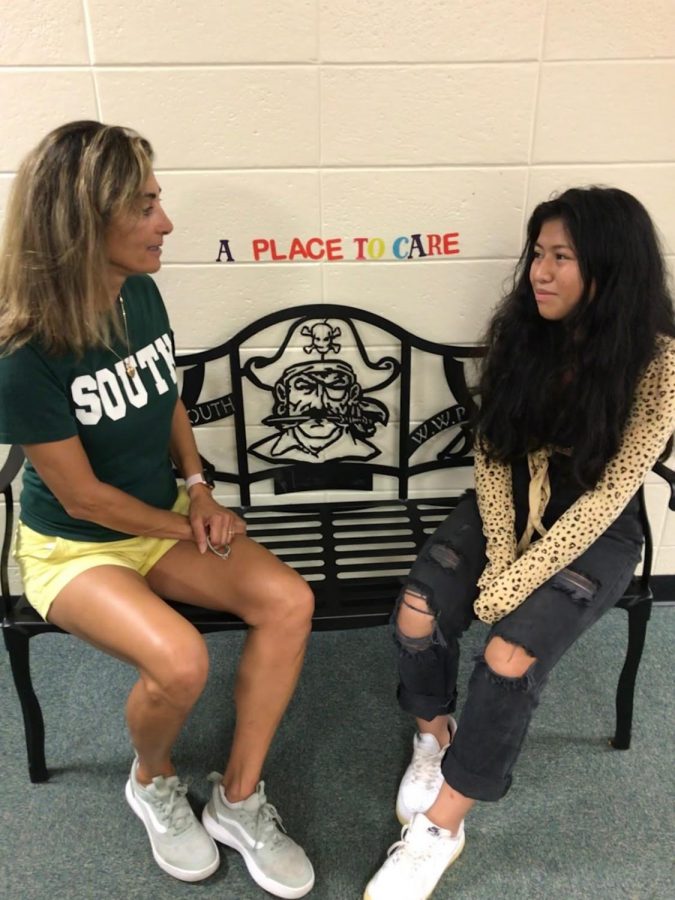Friendship Benches at South encourage connections
November 1, 2019
Friendship Benches are “a place to care.” The Friendship Bench is an idea that is spreading around the world to encourage conversations that promote social and emotional well-being in the community.
The Friendship Bench was initiated in Zimbabwe by Psychiatrist Dr. Dixon Chibanda after he realized that there were not enough therapists or psychiatrists to provide adequate mental health support to those who needed it.
In Zimbabwe, as in other countries, grandmothers are important figures who provide support for family members and are the ones who connect with others in the community.
In 2006, Dr. Chibanda trained ten grandmothers in evidence-based talk therapy, a form of therapy that employs communication and other methods that are specific to the needs of each patient. The grandmothers are known as lay-health workers, meaning that they are non-professionals trained to promote psychological and emotional health and provide talk therapy.
There are now many grandmothers in multiple communities, according to Dr. Chibanda in his 2017 TedTalk in New Orleans, LA, who are offering services on wooden benches throughout Zimbabwe. The grandmothers do what grandmothers typically do: connect with people by sharing their own experiences and giving advice.
People who use their services participate in a six-session therapy course that is completed over four to six weeks. Each session focuses on a different aspect of a person’s mental health, such as managing stress and bettering relationships with others.
Clinical trials conducted by Dr. Chibanda have shown that Zimbwabeans who used Friendship Benches showed a reduction in symptoms of mental health issues within six months.
It is no wonder that the idea is spreading around the world. Now, there are Friendship Benches at South.
After seeing a news story about a version of The Friendship Bench in the streets of Brooklyn, NY, Health and Physical Education teacher Lisa Hayden was taken by the idea.
“Kids spend so much time on social media,” she said, “so I think it’s really good to have a place where people put down their phones and really listen to each other.”
During free periods, she hopes to see students and teachers sitting on the benches, located in the Art Hallway, to talk, share ideas and connect.
“[W]hoever is sitting on that bench will listen to you and be there for you without judging you,” Ms. Hayden said. This attitude aims to create an environment where people are comfortable sharing their thoughts without feeling self-conscious.
Although there won’t be any grandmothers who are trained health workers, like in Zimbabwe, people who use the Friendship Benches at South will benefit from knowing there is a safe place to talk without feeling one might be put down.
“The idea of creating connections with people you might not normally talk to is really powerful,” said Student Assistance Counselor Chelsea Allen. “We can be much more authentic and realize that we have a lot more in common than we do differences, and we can see each other through a less judgemental lens.”
Regarding the impact of Friendship Benches at South, junior Akshata Padalkar said, “I think the benches will make the [South] community stronger because it will give strangers a chance to build strong bonds. Just talking to someone could really help them with any challenges they’re facing.”
Vice Principal Dr. Carla Royster plans to add more Friendship Benches around the school.
“I hope that we latch on to [the idea],” she said, explaining that students will begin to get acclimated with the concept as it becomes a more familiar part of the South community. “[The benches] have their own secret underlying way of feeding into communication,” she added.
The Friendship Bench at South will promote a culture of conversation and offer a place to share stories.
“I think that having a visual reminder as well as a physical place where people can connect is so important,” said Ms. Hayden, “because connection, to me, is like a superpower.”
PHOTO BY ANKITA NAIR

